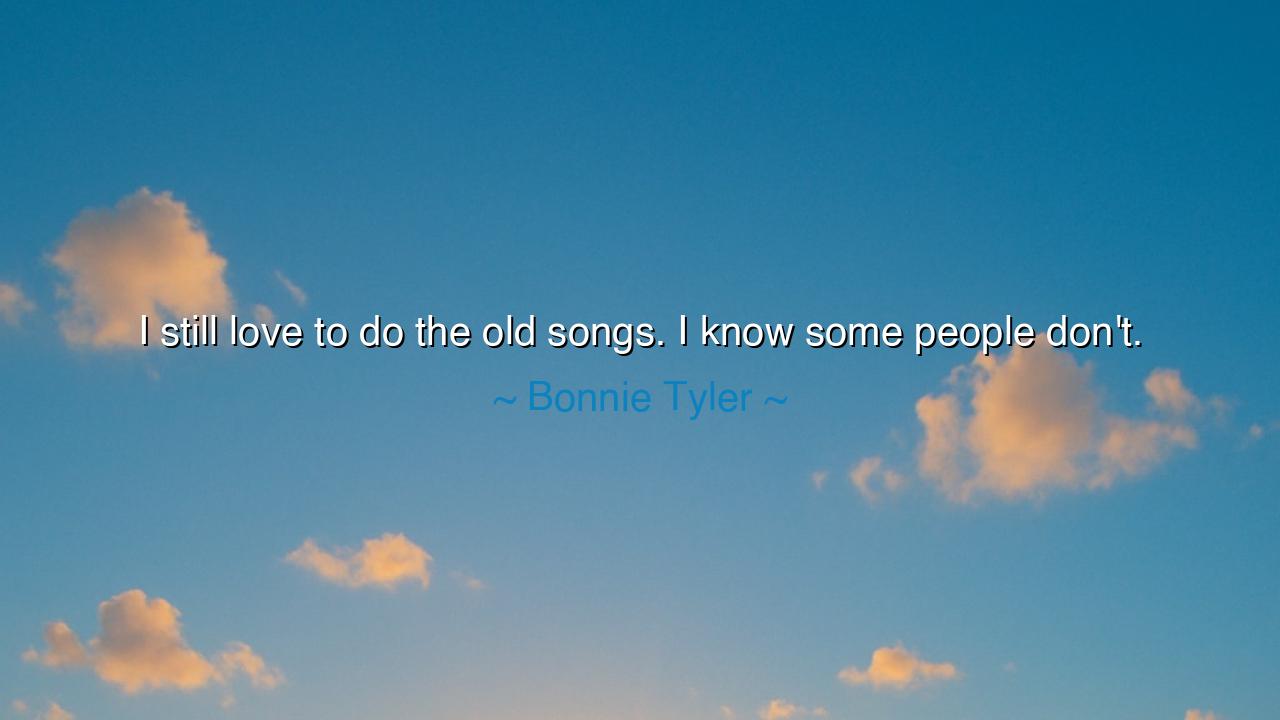
I still love to do the old songs. I know some people don't.






“I still love to do the old songs. I know some people don’t.” So spoke Bonnie Tyler, the voice of fire and heartbreak, whose words carry the quiet power of gratitude and endurance. Though they seem simple at first, these words reveal a deeper truth about the value of memory, the honor of tradition, and the sacred bond between one’s past and present self. In a world that worships the new and forgets the old, Bonnie’s voice rises like a timeless flame, reminding us that the things we once created — the songs of our youth, the dreams of our beginnings — still deserve reverence, for they are the roots from which our greatness grows.
To “love the old songs” is to honor the road that brought you here. It is to remember the long nights of struggle, the first moments of triumph, the echoes of those who believed in you when the world was silent. The old songs are not mere melodies — they are fragments of one’s soul, bound to the spirit of time. Many turn away from what they once were, ashamed of their early efforts, hungry to reinvent themselves. But those who, like Bonnie Tyler, embrace their beginnings are the ones who live with wholeness, for they know that every note of the past still hums in the heart of the present.
There is a tale from ancient Greece of the poet Homer, who in his final years still recited The Iliad and The Odyssey — though newer poets had arisen, and the people sought fresh voices. When asked why he continued to tell those ancient tales, he answered, “Because they are not only my stories; they are my companions.” So too does Bonnie speak: her old songs are not relics, but living friends — witnesses of her journey through time. To sing them is to converse with her own history, to remember who she was and who she has become.
And yet, she says with humility, “I know some people don’t.” Here lies the quiet sorrow of her words — a recognition that the world often hungers for novelty, forgetting the beauty of what once stirred its heart. Many chase after what is new, as though age dulls meaning. But the wise know that time only deepens the resonance of truth. The old songs carry the weight of experience — they are richer now, more human, more real. Their power does not fade; it matures, like a fine wine, seasoned by the storms of life.
There is strength in those who stand unashamed of their past creations. Consider Leonardo da Vinci, who in his later years returned to study his early sketches. He did not dismiss them as naïve — he marveled at the purity of his first vision, unspoiled by mastery. He saw that every masterpiece was born from the courage to begin. So too must we learn from Bonnie’s example: to revisit our beginnings not with scorn, but with reverence, for it is there that the heart’s first fire still burns.
Her words whisper a challenge to every soul: Do not despise your earlier self. The dreams, mistakes, and labors of the past are sacred threads woven into your destiny. To reject them is to tear the fabric of your own becoming. When you sing your “old songs” — whether they be your first creations, your early ambitions, or the simple joys you once knew — you awaken the part of you that first believed, first dared, first loved. And in that awakening, you remember that greatness was never born in perfection, but in persistence.
So, my child, if ever you grow weary of who you once were, if you feel shame for your humble beginnings or for the innocence of your first dreams, recall the words of Bonnie Tyler. Love your old songs. Sing them not for applause, but for truth. Honor your past as you would honor an old friend. Return to your early passions, your forgotten art, your simple joys — for they are the echoes of your soul calling you home.
In the end, the world may change its tune, but the wise will always know: what is timeless cannot fade. For love, art, and memory — like Bonnie’s voice — endure beyond fashion, beyond years, beyond decay. They remind us that what was once genuine remains eternal. And so, keep singing your old songs, for they are not the past — they are your legacy.






AAdministratorAdministrator
Welcome, honored guests. Please leave a comment, we will respond soon